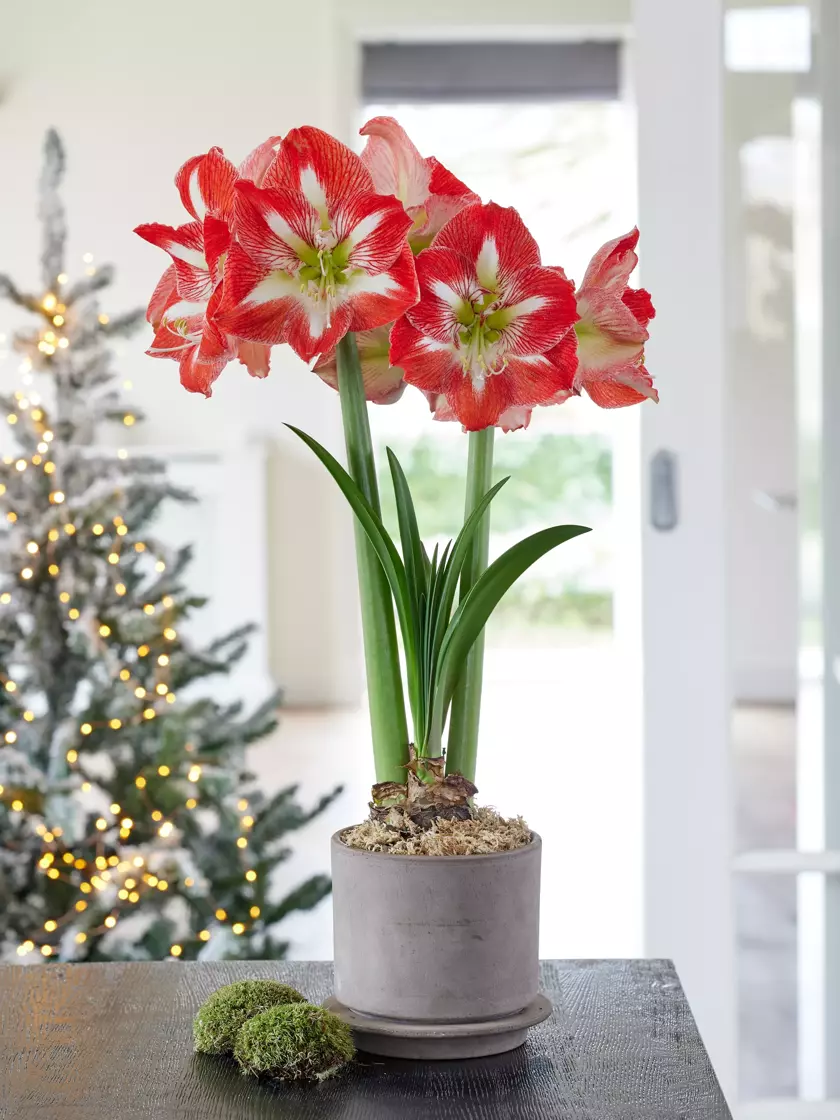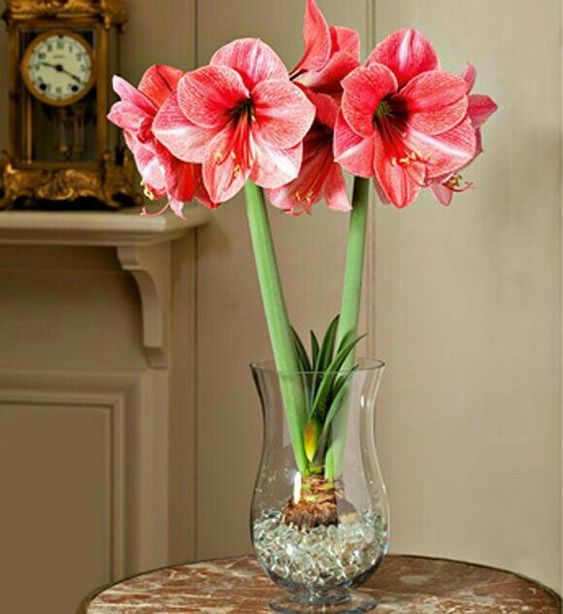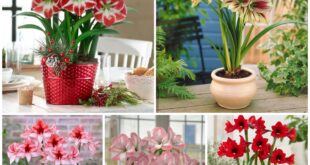Grow amaryllis in pots indoors for a stunning display of its colorful flowers.
Amaryllis comes from Peru and South Africa. Its name comes from the Greek word ‘Amarysso’ what means ‘glitter.’ The flowers can be single or double, reaching up to 4 to 10 inches in size.
They come primarily in red and white, but are also available in salmon, pink, apricot, pink or deep burgundy. If you’ve enjoyed reading about it so far, scroll down to find out more Grow amaryllis indoors!
Some of the best amaryllis varieties
- samba This stunning variety offers ruffled red flowers with white markings and edges. It can reach a height of 18 to 22 inches.
- Apple blossom is a combination of candy pink and snow white flowers on lime green stems.
- red lion has velvety red flowers with white stamens.
- Faro with delicate light salmon and white flowers.
- Monaco Shows a white-green center on large red flowers.
- Summer produces 7-10 inch flowers that range in color from watermelon pink to deep pink with green centers and cranberry rays.
- Fairy tale shows striped red and white flowers on slender stems.
- Matterhorn has large snow-white flowers with a yellow-green center.
- ice queen Shows beautiful, curled white flowers with a green neck.
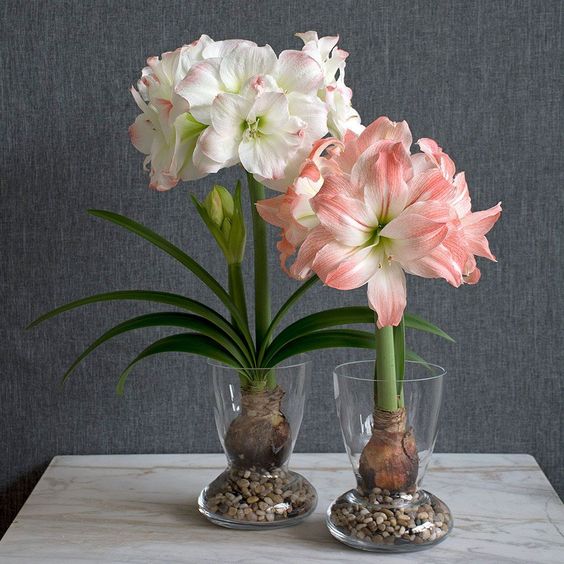
Select a container
A pot 6 to 8 inches deep and 4 to 5 inches wide is sufficient. To enhance the beauty of its flowers use decorative ceramic pots! Use Glass vases And Mason jars can also be a great idea!
Just make sure they are at least 2 to 3 inches wider than the bulb. Also, don’t forget that pots with drainage holes are more suitable as the amaryllis bulb will develop rot in humid conditions.
Selection of light bulbs
A bulb of the amaryllis plant develops two stems, each of which produces four flowers. If you’re looking forward to big flowers, get the biggest bulb you can find! You can buy them online or at a garden center/nursery near you.
Plant amaryllis
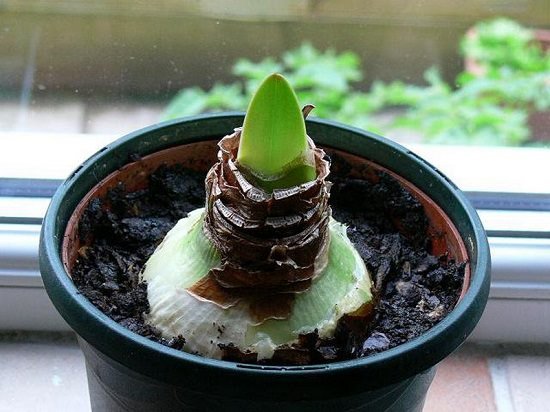
You can plant amaryllis at any time between October and April.
Before planting, soak the bulb in lukewarm water. 3-5 hours would be enough! Fill the pot with compost-rich soil mix and carefully plant the onion in it. Make sure you don’t damage any part of it in the process.
Gently pack the soil around the bulb, covering it up to the neck, not above. Keep the soil moist and water regularly. DDo not allow the soil to dry out completely. Place the pot in a location where it receives indirect light and several hours of direct sunlight.
Requirements for Growing Amaryllis Indoors
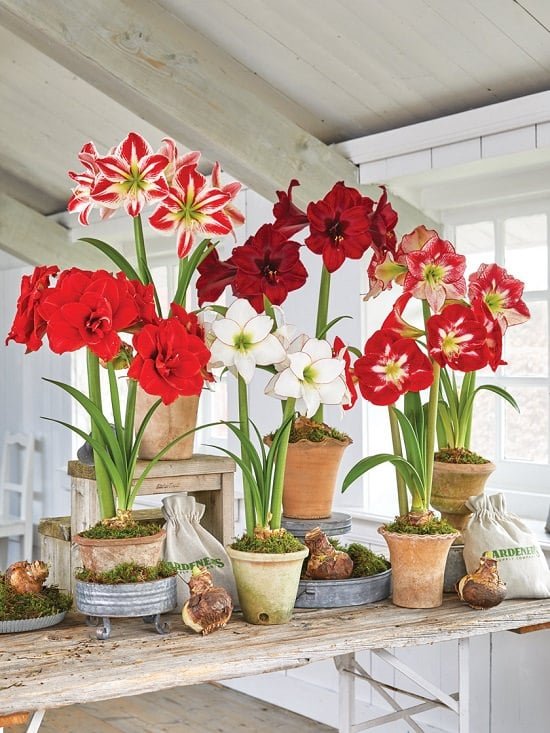
Location
Place the pot so that it receives a mix of direct and indirect natural light. A window that receives indirect light throughout the day and a few hours of mild morning sun is an ideal choice, as amaryllis likes to grow in partial sun.
Floor
Amaryllis does not like wet and soggy soil; Therefore, make a light soil mix by adding two parts clay and one part rotted, aged manure. You can also mix one part sand, one part compost, and one part clay to create the right balance of well-drained soil.
Water
Water your indoor amaryllis plant when the topsoil feels dry. You can prick your finger to feel the moisture in the growing medium or use a moisture meter. Do not leave the plant standing in water, as wet soil encourages root rot and attracts pests.
Amaryllis care
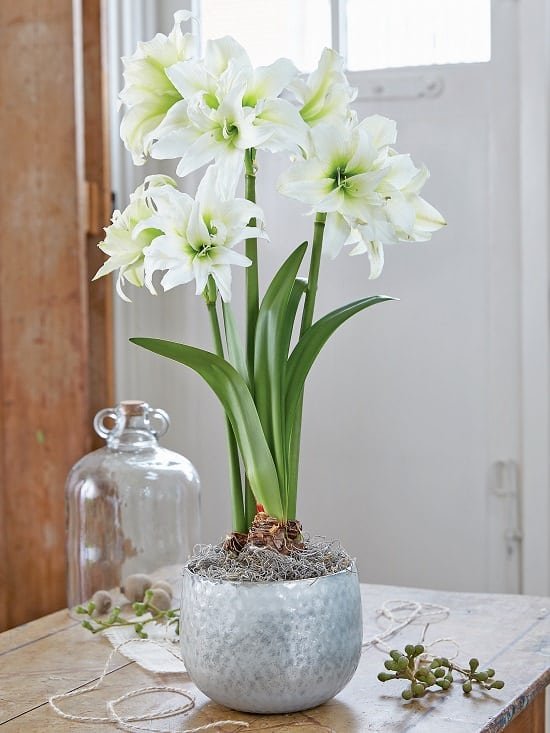
fertilizer
You can fertilize the plant every 3-4 weeks Using a balanced liquid fertilizer. Be sure to follow label directions for directions. You can also choose one Flower booster Fertilizer.
Repotting
Once the bulbs outgrow the pot, you will need to repot the plants. The best time is when the plant is dormant. Choose a pot that is at least 3 to 4 inches wider than the bulb. Only plant two-thirds of the bulb in the soil.
Pruning and cutting off
After blooming, cut the old flowers off the stem using secateurs or scissors. Also, trim the hanging stems back to the top of the bulb.
Pests and diseases
Carefully inspecting bulbs when purchasing them can reduce the risk of infestation. Red spots can affect both the health and appearance of amaryllis.
Small red or pink spots may appear on the bulb’s skin, resulting in a weak, easily breakable flower stalk. Aphids can also be seen on the stems of plants, but you can easily control them if you grow them indoors.
Plant the bulbs in fresh potting soil in a sterile pot. Treat the plant with a fungicide if disease persists.
How do you cut amaryllis flowers?
Amaryllis looks stunning as a cut flower. However, you have to take good care of them after cutting.
- Using a sharp knife, cut the flower at a 45-degree angle. Turn the stem over and fill the hollow stems with water. Seal the opening with cotton wool.
- Take a clean vase, fill it with water and place the flowers in it. You can also add cut flower food.
- Change the water for both the stem and the vase every 2-3 days.
- With proper care, the flowers last 7-10 days.
Can you grow amaryllis all year round?
After the plant finishes flowering, cut off the flowers, making sure to leave the leaves hanging. After the last frost, move it outdoors and place it in dappled sunlight. Water until September and then move the plant to a cool, dark place.
A closet or basement would be a good choice. The plant will go into a dormant phase. In December, place it in a sunny location and start watering. The plant will bloom again!
Amaryllis toxicity
The plant contains the Alkaloid lycorine, which is toxic to pets. So be careful if you have a dog or cat in your home. If swallowed, salivation, vomiting, loss of appetite and diarrhea may occur. Contact a veterinarian immediately if your pet swallows amaryllis.
 careyfashion.com Carey Fashion
careyfashion.com Carey Fashion
